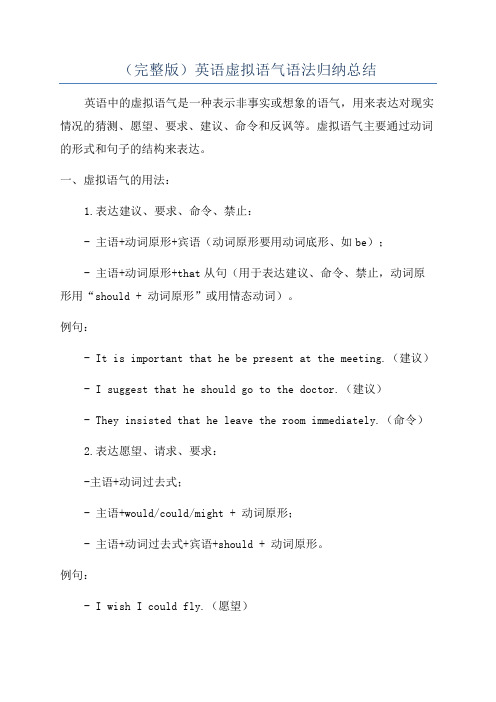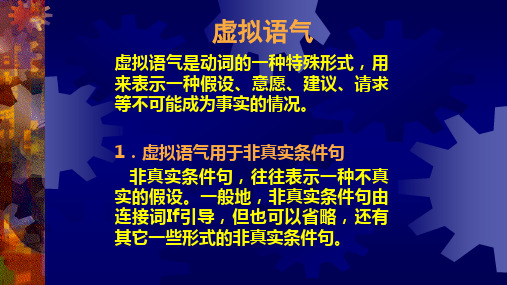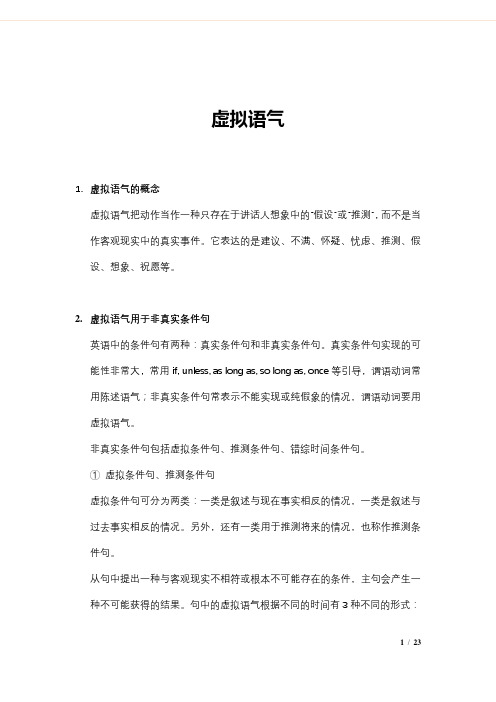语法——虚拟语气
(完整版)英语虚拟语气语法归纳总结

(完整版)英语虚拟语气语法归纳总结英语中的虚拟语气是一种表示非事实或想象的语气,用来表达对现实情况的猜测、愿望、要求、建议、命令和反讽等。
虚拟语气主要通过动词的形式和句子的结构来表达。
一、虚拟语气的用法:1.表达建议、要求、命令、禁止:- 主语+动词原形+宾语(动词原形要用动词底形、如be);- 主语+动词原形+that从句(用于表达建议、命令、禁止,动词原形用“should + 动词原形”或用情态动词)。
例句:- It is important that he be present at the meeting.(建议)- I suggest that he should go to the doctor.(建议)- They insisted that he leave the room immediately.(命令)2.表达愿望、请求、要求:-主语+动词过去式;- 主语+would/could/might + 动词原形;- 主语+动词过去式+宾语+should + 动词原形。
例句:- I wish I could fly.(愿望)- I would appreciate it if you could help me.(请求)3.表示虚拟条件:- If条件从句中的谓语动词用过去完成时,主句用would/should/might/could + have + 过去分词;- If条件从句中的谓语动词用过去时,主句用would/should/could + 动词原形。
例句:- If I had known his phone number, I would have called him.(虚拟条件)- If you had listened to me, we could have finished the project earlier.(虚拟条件)4.表达建议、要求、祝愿:- If only内部称述 + 主语 + 过去式。
高中语法——虚拟语气

虚拟语气:非真实条件句Examples:与现在事实相反:If I were you, I should /would go at once.与过去事实相反:If you had been there last night, nothing would have happened.与将来事实相反:If you were to visit the school tomorrow, you would see me.If you should meet him, you would say “hello” to him.1.虚拟语气的were除了在If I were you的结构中不能改动外,其它有些情况可用was. 2.Were to do 的可能性最小,should+do的可能性最大。
3.如果表示否定的意思,多用过去时结构,用should 和were to比较少。
错综时间条件句:有时在非真实条件句中,主句谓语动词所表示的动作和条件从句中谓语动词所表示的动作并不同时发生,这时动词的形式并不完全按照上述表格来进行,而需要按照各自的时间来调整,这样的句子就叫错综时间条件句。
If you had followed the doctor’s advice(then),you would be all right now.(你现在就好了)If you had followed the doctor’s advice, you would have been all right then.(你那时就好了)If you had watered them more, the crops would be growing still better.(错综时间条件句中,要特别注意时间状语。
在这种情况下,必需明确给出时间,或通过上下文可明显看出时间不同,否则就按前面表格中一般时间搭配使用。
)If I hadn’t finished my composition by now, I would be working on it tomorrow.(从句表示与过去事实相反,主句表示与将来事实相反。
高中英语语法学案--虚拟语气

虚拟语气归纳复习一、虚拟语气在条件状语从句中(一) 虚拟条件句中的三种时态:1. 与现在事实相反:If + S +did / were , S + would /should / could / might+ do2. 与过去事实相反:If + S + had done , S + would / should / could / might + have done3. 与将来事实可能相反:If + S + did / were/ should do /were to do, S + would /should / could / might+ do1)If I _________________(be) tired, I _______________________(take) a rest.2)If I had known his address, I______________________________________(write) a letter to him.3)I you __________________(come) yesterday, you __________________________(meet) him.4)If I _____________________________(be) free tomorrow, I__________________( go) to the library.5)If the sun _____________________(stop) shining, only one smile from you____________________(make) theworld bright.6)I ___________________________(appreciate) it if you ______________(can) reply to me as soon as possible atyour convenience.7)Even if he ______________(be) here, he _______________________________(solve) the problem / issue.8)If he _________________________(drive) more carefully, he ___________________________(avoid) the caraccident yesterday.9)What ____________________________ (happen) if we _______________________________ (not work) hard?10)If the traffic ___________________(be ) so heavy, I could have been back by 6 o’clock.(二) 虚拟条件句中的混合时态:有时条件从句和主句的时态不一致,但必须有明确的时间状语表明不同的时间。
高中英语语法讲解——虚拟语气(共49张PPT)

与现在 从 句 did,were, V-ed 事实相反 主 句 would(should,could,might)+v.
与过去 事实相反
从 句 had+V-ed/been 主 句 would(should,could, might)
+ have+v-ed
对未来的 从 句 were to/should+ v 虚拟推测 主 句 would(should,could,might)+v.
--I don’t think he should have done the favor for you. 我觉得他是不会帮你忙的。
1.3. 虚拟语气用于主语从句
1.3.1.
句型
1.表达虚拟语气的主语从句的一般形式为:
It is/was +引起虚拟语气的形容词或过去分 词+含虚拟语气的主语从句
但愿你没有那样说。
2.如果表示对将来的愿望,从句谓语动词 用 “would (could, might )+动词原形” 的形式。
--I wish you would do the favor for me. 但愿你会帮我这个忙。
--I wish I could speak several languages. 但愿我会说好几种语言。
1.2.虚拟语气用于宾语从句
1.2.1.句型“…wish that…”
在wish后的that宾语从句中: 1.如果表示对现在的愿望,从句谓语要使用过去
时: (1)从句谓语动词如果是be,则用were形式。 (2)从句谓语动词如果是行为动词,则用过去
时形式。 --I wish I were a bird. 但愿我是只鸟儿。 --I wish you didn’t talk like that.
高考英语语法——虚拟语气

高考英语语法之虚拟语气(一)语气的种类:英语句子中谓语动词的语气有四种:1. 陈述语气(The Indicative Mood)陈述语气用于直截了当地陈述事实、描述状态:He has publishedquite a number of essays this year .他今年已发表了好几篇论文。
2. 祈使语气(The Imperative Mood)祈使语气用于提出请求、命令、建议或是劝告等:Wait outside untilyou are asked . 请在外面等候,请你进再进去。
Let's just take abreak, shall we ? 我们休息一会儿,好吗?3. 疑问语气( the interrogative mood ) :用来提出问题Where are you from?4. 虚拟语气(The Subjunctive Mood)虚拟语气用于表示主观愿望和假设的虚拟情况。
虚拟语气不太顾及事实的存在,它表现出说话人的主观因素比较多。
所以说话人所讲的内容往往是与事实相反的;或是其实现的可能性微乎其微,甚至于没有实现的可能性。
当然,有时为了使说话的语气客气、缓和、委婉,也使用虚拟语气。
If I had moremoney, I would buy a bigger apartment.我要是有再多一点钱,我就买一套更大一些房子。
(二) 虚拟语气的种类:虚拟语气用来表示说话人的主观愿望或假想,所说的是一个条件,不一定是事实,或与事实相反。
虚拟语气在条件句中应用比较多;条件句可分为两类,一类为真实条件句,一类为非真实条件句。
非真实条件句表示的是假设的或实际可能性不大的情况,故采用虚拟语气。
1.真实性条件句①真实条件句用于陈述语气,假设的情况有可能发生,各种结构如下:条件从句主句一般现在时 shall/will + 动词原形祈使句情态动词一般现在时If he comes, hewill bring his violin. 如果他来,会带小提琴来的。
英语语法之虚拟语气

虚拟语气知识要点一、语气是动词的一种形式,它表示说话人对某一行为或事情的看法和态度。
英语中有三种语气:1.述语气:表示谓语动词表示的动作/状态符合客观现实。
2.祁使语气:表示号召、命令、建议、劝告、警告、禁止等。
3. 虚拟语气:表示动作/状态不是客观现实,而是愿望、假设、推测等。
二、虚拟语气的构成例:○与将来的事实相反:1.If Professor Li should have time tomorrow, wecould ask him some questions.2.If there should be no air, there would be no livingthings.3.If it wereto snow tomorrow, they couldn’t goout. ○与现在的事实相反:1. If it rained now, I wouldnotgo shopping.2. If I were a teacher, I wouldbe strict with my students.3. If it werenot for their help, we shouldbe in a verydifficult position.○与过去的事实相反:1. If I hadcome yesterday, I wouldhaveseen him.2. If we hadstarted earlier, we shouldnothavemissedthe train.3. If she hadn’tbeen ill, she mighthavecome.***请注意三种特殊情况:○上面的句子大多都可以改成倒装句,这时If就省略了,同学们要能识别出来。
如:1. Should there be no air, there wouldbe no living things.2. Were it not for their help, we shouldbe in a verydifficult position.3. Had she not been ill, she mighthavecome.○错综时间条件句。
高中英语语法系列--虚拟语气讲义

虚拟语气虚拟语气表示说话人的主观愿望、猜测、建议或与事实不符的假设等,也可以表示可能性较小的情况或不可能发生的情况,而不是客观存在的事实(表示客观事实要用陈述语气)。
虚拟语气是由句中谓语动词的特殊形式表现出来的。
虚拟语气常用于复合句中,也可用于简单句。
比较:If she asks me tomorrow,I shall do it.如果她明天请求我,我会做的。
(陈述语气,说话人认为请求的可能性大)If she asked me tomorrow, I should do it. 假如她明天请求我,我会做的。
(虚拟语气,说话人认为请求的可能性小或不可能请求)1 虚拟语气的用法1-1 虚拟语气用于条件状语从句中1)表示与现在事实相反的情况If I were/was not busy today, I should go with you.如果我今天有空,我会同你一起去的。
If he were/was here,he might talk with you.如果他在这里,他可能会同你谈谈。
If I were you,I wouldn't accept her suggestion.如果我是你,我不会接受她的建议。
If I knew the answer to the question,I should/ would tell you.如果我知道问题的答案,我当然会告诉你。
If we left now, we should/would arrive there in time.如果我们现在就动身,我们会准时到达那里。
If he didn't do exercise every day,he wouldn't be so strong.如果他不每天锻炼,他不会那样强壮的。
If it weren't raining, we would go fishing.要是现在不下雨,我们就去钓鱼了。
英语语法—虚拟语气(最全)

虚拟语气1.虚拟语气的概念虚拟语气把动作当作一种只存在于讲话人想象中的“假设”或“推测”,而不是当作客观现实中的真实事件。
它表达的是建议、不满、怀疑、忧虑、推测、假设、想象、祝愿等。
2.虚拟语气用于非真实条件句英语中的条件句有两种:真实条件句和非真实条件句。
真实条件句实现的可能性非常大,常用if, unless, as long as, so long as, once等引导,谓语动词常用陈述语气;非真实条件句常表示不能实现或纯假象的情况,谓语动词要用虚拟语气。
非真实条件句包括虚拟条件句、推测条件句、错综时间条件句。
①虚拟条件句、推测条件句虚拟条件句可分为两类:一类是叙述与现在事实相反的情况,一类是叙述与过去事实相反的情况。
另外,还有一类用于推测将来的情况,也称作推测条件句。
从句中提出一种与客观现实不相符或根本不可能存在的条件,主句会产生一种不可能获得的结果。
句中的虚拟语气根据不同的时间有3种不同的形式:I would lend him the money if he asked me.他要是问我,我愿意借钱给他。
(意愿)If he had time, he should do it.要是有时间,他愿意做那件事。
(意愿)He could move the big stone if he should try.努力的话,他能搬动那块大石头。
(能力)If he forgot to come, you could go instead.他要是忘了没来,你可要替他来。
(许诺)A.与现在事实相反If I had enough money, I would buy a computer.如果我有足够的钱,我将买一台电脑。
(实际上没有) Were I you I would refuse.如果我是你我会拒绝。
(我不是你)注:从句有时可用If it were not for这种句型,表示“若不是……”。
It it weren’t for your help, we would be in serious trouble.若不是你帮忙,我们会遇到大麻烦。
- 1、下载文档前请自行甄别文档内容的完整性,平台不提供额外的编辑、内容补充、找答案等附加服务。
- 2、"仅部分预览"的文档,不可在线预览部分如存在完整性等问题,可反馈申请退款(可完整预览的文档不适用该条件!)。
- 3、如文档侵犯您的权益,请联系客服反馈,我们会尽快为您处理(人工客服工作时间:9:00-18:30)。
Subjunctive Mood (虚拟语气)
(3)与将来事实相反: 表示与将来事实相反的虚拟语气,条 件从句中的谓语动词可用过去式或 “should+动词原形”或“were to+ 动词原形”。 eg:If I should see/were to see/saw him tomorrow,I would invite him home.
Para6:
Of every 100 serious crimes committed in America, only 33 are actually reported to the police.Of the 33 reported, about six lead to arrest. Of the six arrested, only three are prosecuted and convicted…
2.If you had got up earlier, you could have caught the train.
3.Had he If I had time, I would study French. 4.known her address, he would had gone to visite her.
表示与现在事实相反的虚拟语气,条件从 句动词用过去式,主句动词为 “would/should/could/might+动词原形”
eg:If I were ten years younger,I
would start all over again.
如果我在年轻十岁,我会从头开始的。
Subjunctive Mood (虚拟语气)
(2)与过去事实相反
表示与过去事实相反的虚拟语气,条件 从句中的动词用“had done”,主句动词 用“should/would/could/might/have done”
eg:If we had had enough rain last year,
we could have gained a good harvest.
Lesson three
More crime and less punishment
Grammar about para6 to para10 By:jony
Subjunctive Mood (虚拟语气)
它是一种动词形式,表示说话人的某种假设、愿望、怀疑、 猜测、建议等含义。 (1)与现在事实相反
Байду номын сангаас那些获得假释 期的人
extent :(1)the point or degree to which something extend 范围,范围,程度 (2)the distance or area or volume over which something extends 宽度,长度,大小
=although we can’t possibly know exactly how many crimes are comiitted by released prisoners in a specific year,we do know how many of those people under parole are convicted again in for serious crimes and put into jail again.
使用虚拟语气时,有时候可以省略引导条件状语从句的连 词if。这时,从句部分要使用部分倒装,即将从句部分的 助动词were / had / should等提到主语前面。如: Were I you, I would not tell him that.
Para6:
And, of crouse,prison officials must make room for the new prisoners sent almost daily from the courts. attributive clause
如果明天见到他,我会邀请他到我家。
Para8:
If we had kept them in jial for an additional year, how many crimes would have been prevented?
与过去事实相反:假使他们在狱中多待 一年,会阻止多少件犯罪的发生呢? 但事实上过去并没有实施这个假设,他 们并没有在过去在监狱里多呆一年。
Para9:
If we had a place to keep the 124,000 released prisoners,it would have cost us $1.6 billion to prevent 15,000 crimes.
与过去事实相反:假设我们有地方容纳那12.4
万名刑满释放人员,就相当于用花费16亿美元来阻 止15000起犯罪案件。 但事实上并没有地方容纳12.4万刑满释放人员。
这里用过去分词做状语从句中的主语,表明作者已经在面对这 那些数据里的事实了。意思就是:面对着这样真实的数据,我 不会愚蠢到要为打击犯罪献计献策。
Para7:
And if it were willing to pay, long prison sentences may not be effective in reducing crime.
Subjunctive Mood ?which kind? Question:why here use “may not be”,not “might not be”?
5.If it snowed tomorrow, many crops would die of cold. 6.If they had been united, they wouldn’t have been defeated. 7.If it were seen from a high mountain, the field in which wheat is growing would look like a great green sea. 8.should she be my daughter,I wouldn’t allow her to study abroad.
Para10:
Faced with the reality of the numbers,I will not be so foolish as to suggest a solution to the crime problem.
Analyse:Here use the past participle as the suject in the adverbial clause ,it means the author has known the “reality of the numbers” in the past. In other words,It could be said that “since I had faced with the reality of the numbers…”
这句话是定语从句,后面“sent almost daily from the courts”是修饰“the new prisoners”. 从句中省略了主语和谓语动词,整句话应该为:
And, of crouse,prison officials must make room for the new prisoners who are sent almost daily from the courts.
Answer:根据上下文的理解,后面主句部分是对现 在问题的描述,而且是对现在还有影响,所以主句 中没有用虚拟语气,即是不用虚拟语气的“would, could,might”中的任何一个。
翻译:长时间的判刑也不会对减少犯罪有很大的影响。
Para8:
While it is not possible to know the ture amount of crime committed by people released from prison in any give year,we do know the extent to which those under parole are jailed again for major crime convictions. 到达什么样的程度
judgement :
Please give a judgement which type of the subjunctive moods the following sentences belong to. 1.If I were you, I would complain to the director .
